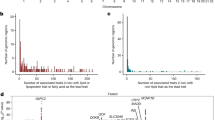Abstract
The Greek diet is characterized by a high total fat but low saturated fat intake. In a hospital-based case-control study of female breast cancer conducted in Athens (1989-91), 820 patients with confirmed cancer of the breast were compared with 795 orthopaedic patient controls and 753 hospital visitor controls, matched to the cases by age and interviewer. Diet was ascertained through a semiquantitative food frequency questionnaire; macronutrient intakes were estimated from the nutrient content of a selected typical portion size for each specified food item, summed for all items. Logistic regression was used to analyse the data, controlling for demographic and reproductive risk factors for breast cancer as well as for total energy intake and mutual confounding influences among nutrients. There was no significant or suggestive association of total protein, total fat, categories of fat or total carbohydrates with breast cancer risk. Thus, the mutually adjusted relative risk per quintile and (in parenthesis) 95% confidence interval were: for protein, 1.06 (0.94-1.20); saturated fat, 0.99 (0.89-1.11); monounsaturated fat, 0.97 (0.88-1.07), polyunsaturated fat, 1.05 (0.97-1.13); and total carbohydrates, 1.03 (0.94-1.12). In alternative analytical approaches only total protein appeared to be positively associated to the occurrence of breast cancer with some consistency, but the results were far from statistically significant. These findings do not support a role for fat or other energy-generating nutrients in the aetiology of breast cancer.
This is a preview of subscription content, access via your institution
Access options
Subscribe to this journal
Receive 24 print issues and online access
$259.00 per year
only $10.79 per issue
Buy this article
- Purchase on Springer Link
- Instant access to full article PDF
Prices may be subject to local taxes which are calculated during checkout
Similar content being viewed by others
Author information
Authors and Affiliations
Rights and permissions
About this article
Cite this article
Katsouyanni, K., Trichopoulou, A., Stuver, S. et al. The association of fat and other macronutrients with breast cancer: a case-control study from Greece. Br J Cancer 70, 537–541 (1994). https://doi.org/10.1038/bjc.1994.341
Issue Date:
DOI: https://doi.org/10.1038/bjc.1994.341
This article is cited by
-
Total energy intake and breast cancer risk in sisters: the Breast Cancer Family Registry
Breast Cancer Research and Treatment (2013)
-
Olive oil intake is inversely related to cancer prevalence: a systematic review and a meta-analysis of 13800 patients and 23340 controls in 19 observational studies
Lipids in Health and Disease (2011)
-
Diet and expression of estrogen alpha and progesterone receptors in the normal mammary gland
Cancer Causes & Control (2009)
-
Dietary fat and breast cancer risk revisited: a meta-analysis of the published literature
British Journal of Cancer (2003)
-
Flavonoid intake and breast cancer risk: a case–control study in Greece
British Journal of Cancer (2003)



